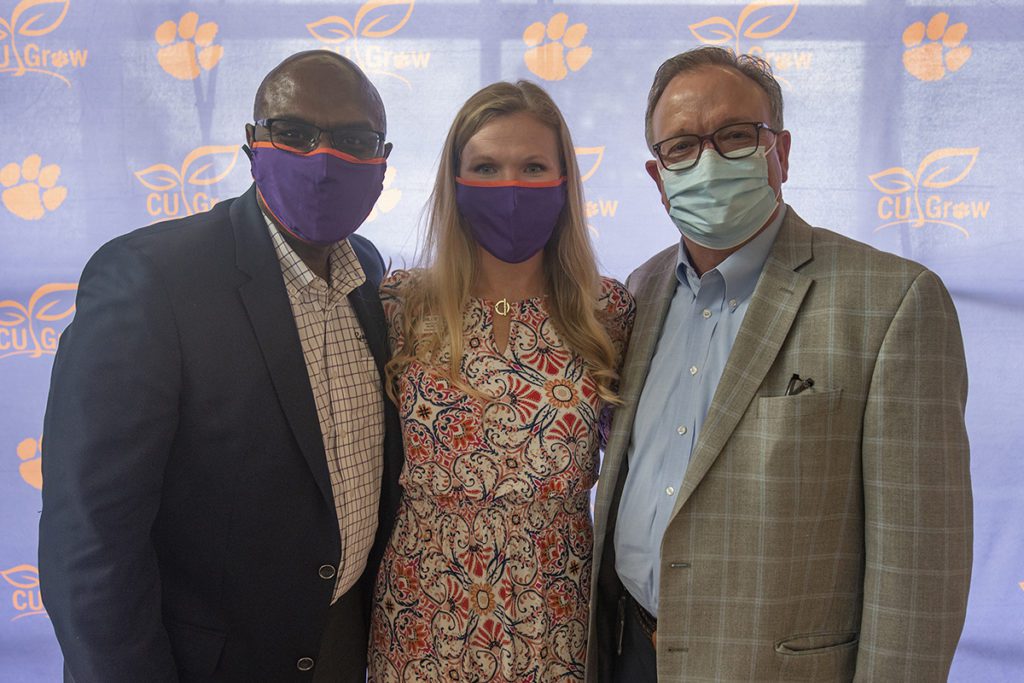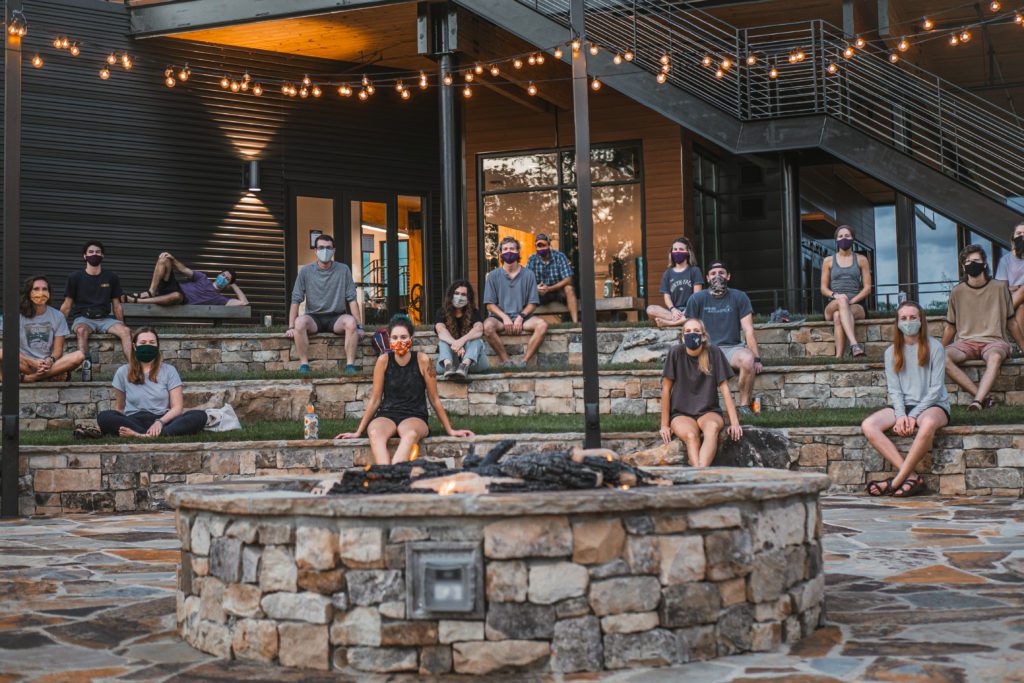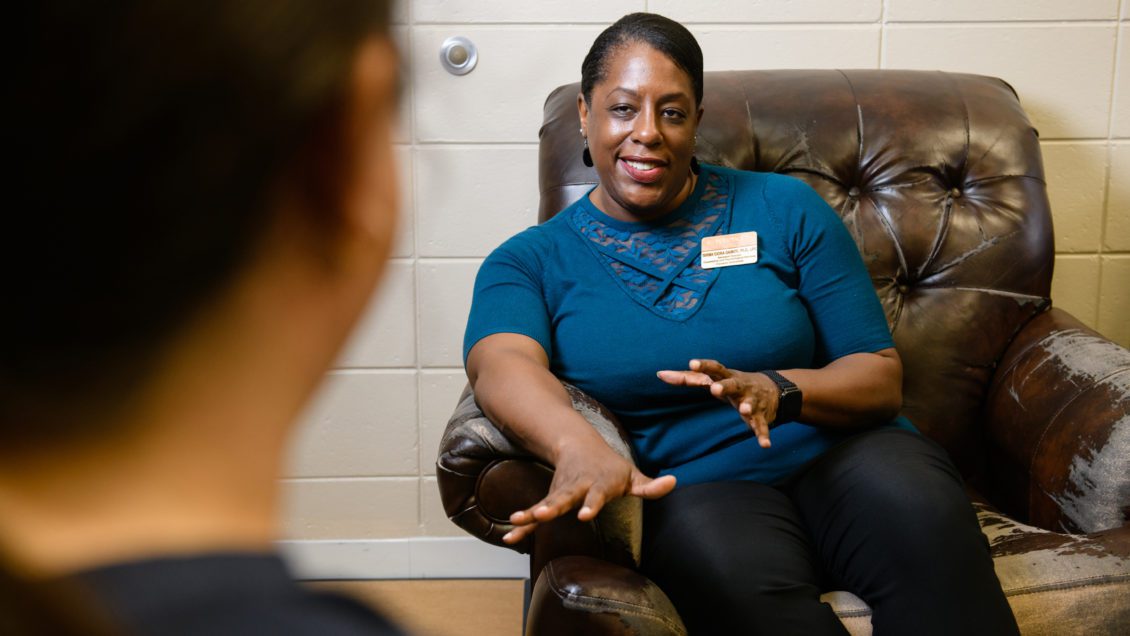Health, safety and wellness was identified several years ago as one of the four core themes within the Division of Student Affairs at Clemson. Twenty months into a global pandemic, the work supporting this particular core theme has never been more important.
On Tuesday, about 45 guests came together over Zoom to learn about some of the work done throughout the division — and beyond — in support of health, safety and wellness as part of the Experience: IMPACT series.
“In our 2019 staff experience survey, respondents made it known they wanted more opportunities to celebrate and share the good work being done across our division – and possibly even spark innovation in their own areas,” said Kristin Walker-Donnelly, who serves as director of assessment for Student Affairs. “With Experience: IMPACT, we learn how they identify these opportunities to better support our students and their success.”
Five staff members — including a guest from outside the division — shared 10-minute presentations specific to meeting challenges or opportunities within their department or area over the course of the first meeting for 2021-22.
—
Chloe Dixon has been assistant director of Healthy Campus for years and coordinates the Aspire to be Well program, a course requirement for all incoming students at Clemson. In 2020-21, Dixon applied for and was chosen to take part in the inaugural class of CU Grow, which supports the personal and professional growth of staff.
Dixon’s time in CU Grow included workshops, trainings, experiential learning and skill development. It also included volunteer service, where she actually teamed with the entire cohort to help build ramps for elderly people in Pickens County through Rebuild Upstate.

CU Grow also required each member of the program to conduct a project specific to their field. For Dixon, she helped provide information and resources to students who were displaced from their residences due to isolation or quarantine for COVID-19. She implemented Be Well Wednesdays over Zoom in March and April. The sessions were facilitated by UPIC interns and offered students tips on resilience, stress management, wellness dimensions and an introduction to campus resources.
“My CU Grow experience was really tailored to my interest area,” she said. “It was a really impactful experience for me and I highly recommend it to others.”
The results of the Be Well Wednesdays pilot program were positive and as a result, Healthy Campus recently implemented a Friday Well-Being series as a continuation of the healthy lifestyle initiative during the Fall 2021 term.
—
Counseling and Psychological Services (CAPS) went to virtual appointments almost instantly in March 2020 at the onset of the pandemic. However, the move to modified operations yielded several benefits to Dr. Birma Gainor — interim director of CAPS — and her staff.
The most noticeable difference came by way of initial student assessment procedures. Prior to COVID-19, students could come to Redfern Health Center from 10 a.m.-2:30 p.m., fill out paperwork, be evaluated and were assigned a counselor based on the appropriate level of care identified.
What Gainor and her staff discovered was a process that needed tweaking. Too often students were buried in lengthy paperwork, leading to a delay accessing certain services.
“Students were spending more time in assessment,” she admitted. “During the pandemic, we changed our intake process to include an initial phone screening to determine risk assessment, and that might be 15 minutes as opposed to a lengthy process like we had previously. Once a student is assessed, they are paired to a specialized counselor. Whatever concerns are presented in the phone screening, we’re able to address directly. Students don’t like telling their story multiple times, so this has helped us get them started with treatment more efficiently.”
Gainor did acknowledge the change in intake has presented challenges. Some students are not suited for virtual counseling. No-shows or last-minute cancellations create gaps in space and time where counselors are not seeing students. Her team continues to work through the new process, but overall, she believes it’s created a much more streamlined approach to assessing students.
—
Most students access the Clemson University main campus from the east. As such, one of the biggest challenges facing the staff in Campus Recreation has been increasing awareness of the many amenities and offerings at the impressive Snow Family Outdoor Fitness and Wellness Complex.
What started as a lead gift from Dave and Lynnette Snow has grown into two synthetic turf fields for Intramural and Club Sports, as well as the recent addition of the Andy Quattlebaum Outdoor Education Center — more affectionately known as Andy’s. Problem is, Andy’s — which houses the Clemson Outdoor Recreation Education (CORE) program — opened right as the COVID pandemic took off.

Director of Programs and Assessment for Campus Recreation, Robert Taylor, believes the complex will be a point of destination for current and future generations of Tigers. In the next couple of years, the complex will add two softball fields, support facilities and beautification elements.
“This property is such a unique space available to students here at Clemson,” he said. “When you look across the country, very few places have a lakefront recreation area like this. Coming out of the pandemic, students are seeking outdoor experiences and this is something we’re fortunate to have.”
The numbers back up Taylor’s assessment. Behind a steady stream of web updates, social media posts, video spotlights and campus partners utilizing Andy’s, outdoor equipment rentals have been steadily increasing. More than 4,600 items ranging from tents to paddleboards were rented at the facility from the beginning of the Fall semester through Oct. 8 — a number Taylor and Campus Recreation anticipate continuing to rise as students become more aware of all that Andy’s has to offer.
—
As a graduate assistant in the Office of Community and Ethical Standards (OCES), one of Abby Dill’s primary responsibilities was to oversee the Tiger STEPS program for students. Designed specifically to withhold adjudication for relatively minor violations of the Code of Conduct, the program focuses on values and the importance of choices, takes 3-4 hours to complete online and ends with a reflection paper.
One of the things discovered by Dill — now a full-time employee and assistant director in OCES — was the program was not really resonating with students. Most viewed it as an unnecessary “deep dive” for silly mistakes.
“We saw in reflections that students weren’t taking the assignment seriously and actually saw some blatant disrespect and disdain for the program,” admitted Dill, who said 1,300+ cases have been brought forward through Tiger STEPS the past couple of years. “By creating Tiger Accountability, our hope was students would actually want to participate in it.”
Tiger Accountability was developed by Dill and put into action for the Fall 2021 term. The online-only program takes 45-60 minutes to complete and focuses on Clemson policies, as well as federal, state and local regulations. The program is off to a great start, she said, with 280 cases completed this semester, less pushback from students and positive response from the Student Judicial Board.
Arguably the biggest benefit of the new program is students have a new appreciation for Tiger STEPS, which now serves as a remediation process for more serious or repeat offenses and no longer a “catch-all” for Code of Conduct violations.
“I thought Tiger STEPS was a burden at first,” said one anonymous student this semester after Tiger Accountability was implemented. “However, I now understand that this program goes beyond self-persecuting the individual who made a bad decision and truly allows them to reflect and learn about their lives and thought processes.”
—
Amy Burke was the special guest presenter during the session. She serves as a counselor within the Office of Student Financial Aid. Her presentation focused on financial wellness, one of the dimensions of overall well-being.
The challenge her office continues to face is pretty straightforward: there is a well-documented need for financial wellness and financial literacy education among students.
“We wanted to create some literacy and experiential components that addressed the needs we were seeing,” she said.
The office has taken several steps to increase educational opportunities for students, specifically through the creation of a financial literacy website, financial awareness week each Spring and by offering formal programming for student groups, undergraduates and graduates.
The work has resulted in an increase in presentation requests asked of her office and positive formal and informal feedback among students. In addition, Burke is in the process of working toward a Ph.D. Her dissertation focuses on assessing financial wellness programming, which she hopes will lead to the creation of even more educational opportunities provided to Clemson students in the coming years.

